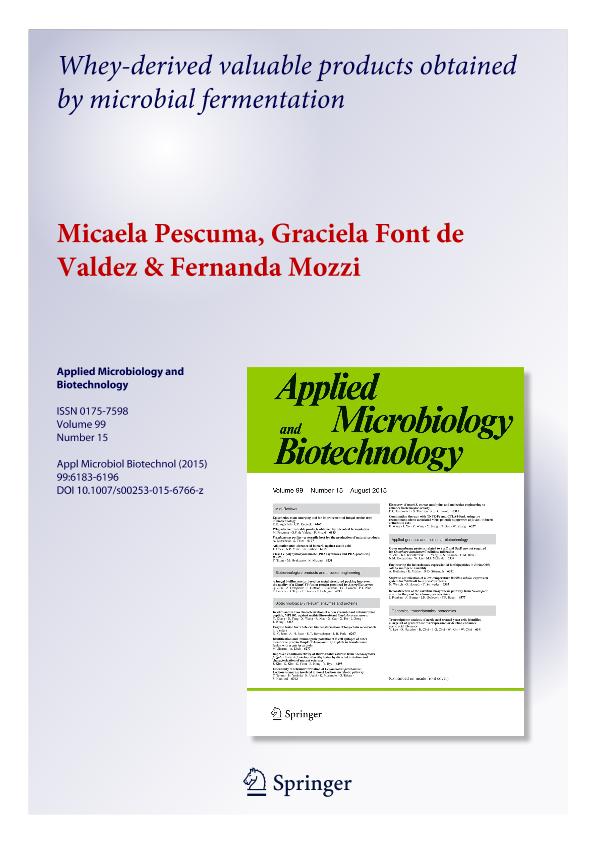Mostrar el registro sencillo del ítem
dc.contributor.author
Pescuma, Micaela

dc.contributor.author
Font, Graciela Maria

dc.contributor.author
Mozzi, Fernanda Beatriz

dc.date.available
2015-11-24T17:01:50Z
dc.date.issued
2015-08
dc.identifier.citation
Pescuma, Micaela; Font, Graciela Maria; Mozzi, Fernanda Beatriz; Whey-derived valuable products obtained by microbial fermentation; Springer; Applied Microbiology And Biotechnology; 99; 15; 8-2015; 6183-6196
dc.identifier.issn
0175-7598
dc.identifier.uri
http://hdl.handle.net/11336/2909
dc.description.abstract
Whey, the main by-product of the cheese industry, is considered as an important pollutant due to its high chemical and biological oxygen demand. Whey, often considered as waste, has high nutritional value and can be used to obtain value-added products, although some of them need expensive enzymatic synthesis. An economical alternative to transform whey into valuable products is through bacterial or yeast fermentations and by accumulation during algae growth. Fermentative processes can be applied either to produce individual compounds or to formulate new foods and beverages. In the first case, a considerable amount of research has been directed to obtain biofuels able to replace those derived from petrol. In addition, the possibility of replacing petrol-derived plastics by biodegradable polymers synthesized during bacterial fermentation of whey has been sought. Further, the ability of different organisms to produce metabolites commonly used in the food and pharmaceutical industries (i.e., lactic acid, lactobionic acid, polysaccharides, etc.) using whey as growth substrate has been studied. On the other hand, new low-cost functional whey-based foods and beverages leveraging the high nutritional quality of whey have been formulated, highlighting the health-promoting effects of fermented whey-derived products. This review aims to gather the multiple uses of whey as sustainable raw material for the production of individual compounds, foods, and beverages by microbial fermentation. This is the first work to give an overview on the microbial transformation of whey as raw material into a large repertoire of industrially relevant foods and products.
dc.format
application/pdf
dc.language.iso
eng
dc.publisher
Springer

dc.rights
info:eu-repo/semantics/openAccess
dc.rights.uri
https://creativecommons.org/licenses/by-nc-nd/2.5/ar/
dc.subject
MICROBIAL FERMENTATION
dc.subject
VALUE-ADDED PRODUCTS
dc.subject
WHEY
dc.subject
WHEY-DERIVED PRODUCTS
dc.subject.classification
Otras Biotecnología del Medio Ambiente

dc.subject.classification
Biotecnología del Medio Ambiente

dc.subject.classification
INGENIERÍAS Y TECNOLOGÍAS

dc.title
Whey-derived valuable products obtained by microbial fermentation
dc.type
info:eu-repo/semantics/article
dc.type
info:ar-repo/semantics/artículo
dc.type
info:eu-repo/semantics/publishedVersion
dc.date.updated
2016-03-30 10:35:44.97925-03
dc.identifier.eissn
1432-0614
dc.journal.volume
99
dc.journal.number
15
dc.journal.pagination
6183-6196
dc.journal.pais
Alemania

dc.journal.ciudad
Berlin
dc.description.fil
Fil: Pescuma, Micaela. Consejo Nacional de Investigaciones Científicas y Técnicas. Centro Científico Tecnológico Tucumán. Centro de Referencia Para Lactobacilos (i); Argentina
dc.description.fil
Fil: Font, Graciela Maria. Consejo Nacional de Investigaciones Científicas y Técnicas. Centro Científico Tecnológico Tucumán. Centro de Referencia Para Lactobacilos (i); Argentina
dc.description.fil
Fil: Mozzi, Fernanda Beatriz. Consejo Nacional de Investigaciones Científicas y Técnicas. Centro Científico Tecnológico Tucumán. Centro de Referencia Para Lactobacilos (i); Argentina
dc.journal.title
Applied Microbiology And Biotechnology

dc.relation.alternativeid
info:eu-repo/semantics/altIdentifier/doi/http://dx.doi.org/10.1007/s00253-015-6766-z
Archivos asociados
